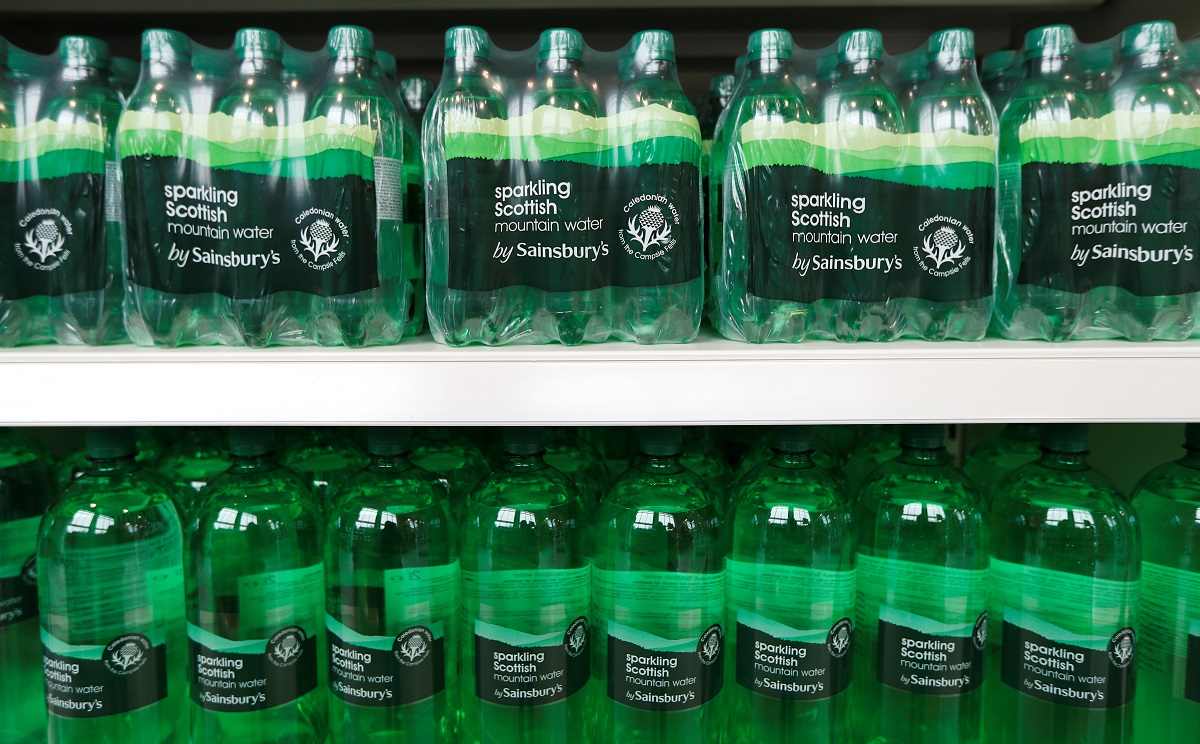
Bottles of own brand sparkling water are displayed in a Sainsbury’s store in Redhill, Britain.
17:07 JST, September 22, 2024
The question:
Is it true that sparkling water is as hydrating as plain water?
The science:
Sparkling water contains the same compound essential for hydration as plain water – H2O.
But the two differ; sparkling water that is carbonated – naturally or artificially – contains dissolved carbon dioxide gas, which, through a chemical reaction, turns into carbonic acid, giving it that fizz.
“This does not interfere with the body’s ability to absorb water and stay hydrated,” said Grace Derocha, a registered dietitian nutritionist and spokeswoman for the Academy of Nutrition and Dietetics.
A 2016 study that examined hydration by 13 different beverages by comparing fluid intake with urine output found that not only was sparkling water just as hydrating as plain water, but it was also as hydrating as many other drinks, including coffee, tea and soda.
In most cases, hydration comes down to how much liquid people drink, which, for many of us, is at least partly influenced by taste and texture.
“That’s where sparkling water, for some people, may have an advantage because if you drink more, you’re likely to be better hydrated than if you drink less,” said Ron Maughan, lead author of the study and a professor at the School of Medicine at St. Andrews University in Scotland.
But try to choose ones without added sugars, Derocha said.
What else you should know:
While the bubbles in sparkling water may encourage some people to drink more, it may deter others. The carbonation can cause bloating or gas, particularly for those who have stomach issues such as GERD and when consumed in large amounts, Derocha said, which varies from person to person.
Additionally, the carbonation may make some people feel full and, therefore, less likely to drink more, she said.
That said, a small study of 21 patients complaining of constipation and indigestion reported that those who drank carbonated water for about 15 days experienced a reduction in their symptoms.
As for other myths about sparkling water, there is no conclusive evidence that it is bad for bone health or dental health.
There have been concerns that the acidity in sparkling water can erode tooth enamel. Beverages that have a low pH – meaning they are more acidic – do have the potential to wear away tooth enamel over time, particularly when consumed often and in large quantities. Regular water has a pH of 7, which is neutral. Coffee measures about 5, lemon juice about 2 and stomach acid about 1.
In a 2016 study of nearly 400 beverages, the two plain sparkling drinks that were tested – S. Pellegrino sparkling natural mineral water and Perrier carbonated water – were not considered much of an erosion risk. S. Pellegrino had a pH of 4.96, and Perrier tested at 5.25. The pH level, ideally, should be above 4, which is considered a “critical threshold,” John Ruby, a retired professor of pediatric dentistry at the University of Alabama at Birmingham and senior author of the study, said in a previous interview. Adding flavor to water, particularly citrus flavors containing citric acid, can make the water more acidic.
The bottom line:
Bubbly or flat, water is water when it comes to hydration. It mostly comes down to personal preference and which type of water you’re most likely to drink to stay hydrated.
Top Articles in News Services
-

Survey Shows False Election Info Perceived as True
-

Hong Kong Ex-Publisher Jimmy Lai’s Sentence Raises International Outcry as China Defends It
-

Japan’s Nikkei Stock Average Touches 58,000 as Yen, Jgbs Rally on Election Fallout (UPDATE 1)
-

Japan’s Nikkei Stock Average Falls as US-Iran Tensions Unsettle Investors (UPDATE 1)
-

Trump Names Former Federal Reserve Governor Warsh as the Next Fed Chair, Replacing Powell
JN ACCESS RANKING
-

Producer Behind Pop Group XG Arrested for Cocaine Possession
-

Japan PM Takaichi’s Cabinet Resigns en Masse
-

Man Infected with Measles Reportedly Dined at Restaurant in Tokyo Station
-

Israeli Ambassador to Japan Speaks about Japan’s Role in the Reconstruction of Gaza
-

Videos Plagiarized, Reposted with False Subtitles Claiming ‘Ryukyu Belongs to China’; Anti-China False Information Also Posted in Japan

























